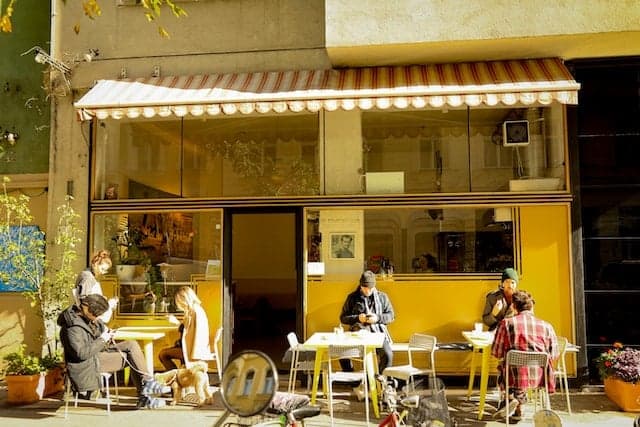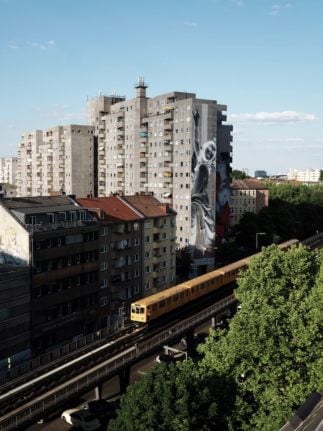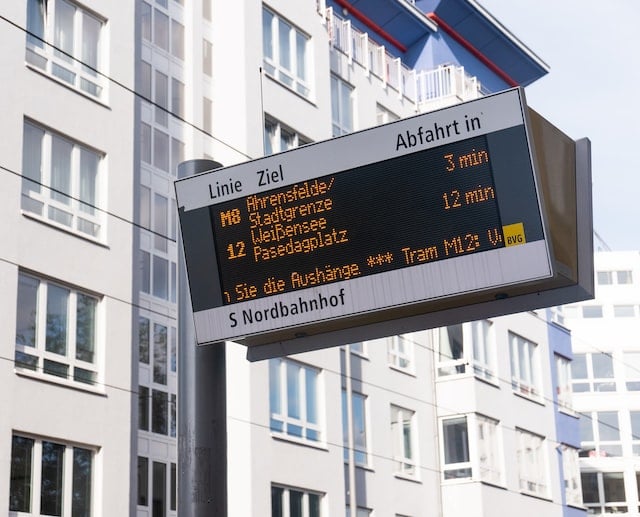Vienna vs Berlin: Which German-speaking city is better to live in?

The European cities of Vienna and Berlin attract internationals from around the world. But which city is best to live in? From the population to wages and the cost of living, we look at several factors so you can compare them.
The Austrian capital Vienna and the German Hauptstadt Berlin are both German-speaking cities in central Europe, have fascinating histories and are a magnet for many people from around the world. But that is really where the similarities end.
Residents of Wien praise the culture and beauty of the city, as well as the high quality of life. Meanwhile, people in Berlin tend to enjoy things that are a little grittier - this is arguably the nightlife capital of Europe (hello, Berghain!). Yet there's really a lot more to everyday life in both of these places.
The Local collected data from various sources to offer a comparison of these two cities.
Vienna
Population: Vienna is by far Austria's biggest city. At the beginning of 2022, around 1.93 million people lived in the city.
About 32.2 percent of Vienna’s residents are foreign nationals, with 37.6 percent born abroad and 42.6 percent of foreign origin. That means for example they either hold a foreign citizenship or are Austrian nationals born abroad.
Wages: In the latest survey by online job platform Step Stone for 2022, the average gross annual salary in Austria is €49,609, and the median salary is €44,500.

A view of Vienna, Austria. Photo by Nguyen Minh on Unsplash
When it comes to Vienna, the average gross annual salary is €52,783 and the median salary is €46,800. That means that people earn on average €4,398 before tax.
Rents: According to the site Numbeo, which gathers user contributed data on cost of living across the world, a one-bedroom apartment in the city centre costs on average €870.38 per month in rent, while a one-bedroom flat outside the centre costs on average costs €664.24.
Meanwhile, Expat Arrivals reports that the average price for a one bedroom apartment in the city centre is €915, an is up to €2,000 for a 3-bedroom place.
FOR MEMBERS: REVEALED: The best and worst districts to live in Vienna (as voted for by you)
Public transport and connections: Vienna's public transport system is world renowned thanks to its reputation for being clean, efficient and relatively cheap. Wiener Linien is the state-owned company that runs public transport, operating five underground lines, 29 tram and 127 bus lines, including 24 night lines.
A great offer in Vienna (which Berlin did consider copying at one point), is the annual season ticket costing €365 - just €1 per day.
"It entitles the holder to travel as often as they want on the underground, trams and buses (with the exception of special rapid bus lines), trains operated by ÖBB (suburban trains) and on services operated by Wiener Lokalbahnen (as far as Vösendorf-Siebenhirten)," says Wiener Linen.
Meanwhile, a day ticket costs €5.80, while a single trip costs €2.40 (there are concessions and under 6s travel free).
International connections: Vienna International Airport, which is the hub of Austrian Airlines, is well connected. It offers flights to destinations across Europe as well as further afield from New York to New Delhi.
Due to the location of Vienna in the east of Austria on the Danube River, there are also great train connections to both western and eastern Europe. Plus you can even take various boat trips on the Danube, including a ferry to Bratislava.
READ ALSO: How much do you need to earn for a good life in Austria?
Berlin
Population: The German Capital is also by far Germany’s most populous city and, by the end of 2022 the number of people living in the city state reached a new record high of 3.86 million.
According to the latest data from Office for Statistics in Berlin-Brandenburg from the end of 2022, the proportion of foreigners living in Berlin made up 24.3 percent of the population, while the share of residents with a migration background in Berlin as a whole was 38.6 percent in 2022.
Wages: According to the jobs website Kununu, the average annual salary for Berlin is €45,934 per year before tax, based on the latest data from October 2022.

A view of Berlin, Germany. Photo by Marcus Lenk on Unsplash
That makes the average monthly wage around €3,827 before tax.
In the site’s rankings of 30 German cities by average annual salary, Berlin comes in at 21st place.
The German cities with the highest average salaries are Munich, where the average gross pay is €55,766 per year, Stuttgart with €55,719 and Frankfurt am Main with €55,403.
The main reason for the relatively mediocre wages for Berliners is the capital's economic structure. Unlike Stuttgart or some regions in Bavaria, Berlin is not a location for strong industries such as automotive suppliers or car manufacturers.
Rents: Rents across Germany have been rising a lot over the last few years and Berlin certainly hasn’t escaped the trend. According to the Berliner Morgenpost, as of June 30th, 2022, the average "cold" rent (before utility costs are added) was €6.52 per square meter per month in the capital - 15 cents more than the year before.
However, some studies have found that asking rents (that is for new contracts) are now over €11 per square metre in Berlin.
Meanwhile, the cost of living site Numbeo, says that a one-bedroom apartment in the city centre costs on average €1,282.83, and a one bedroom apartment outside of the city centre costs €902.31.
Although the rents in Berlin are cheaper on average than some other large cities such as Munich and Hamburg, a major difficulty in Berlin is finding a flat. The competition is fierce because the demand is so high. Many people live in studio flats (known as one-room apartments) because they are slightly cheaper and easier to snag than a one or two-bedroom place.
IN NUMBERS: Who is coming to and leaving Berlin?
Public Transport: Berlin has an extensive and well-developed public transport network, which includes subways, trains, buses, trams and even a ferry that crosses the river Spree.

A sign for Berlin public transport. Photo by Sangga Rima Roman Selia on Unsplash
Three fare zones apply in Berlin: AB, BC and ABC. The AB fare zone covers the city area up to the city limits, while the ABC zone covers the surrounding area of Berlin and Potsdam.
The standard price for a monthly ticket for AB fare zones is €86 and those travelling after 10am can take a reduced monthly ticket for €63.
A standard, single ticket costs €3 and a Kurzstrecke (short distance) ticket for a ride of three stops with a train or 6 with a bus or tram costs €2. A daily travel ticket will set you back €8.80.
At the moment there's a €29 monthly ticket offer covering the Berlin AB area. Later in the year, the nationwide €49 public transport will arrive.
READ ALSO: Berlin to extend €29 monthly ticket and offer new social ticket
International Connections:
Berlin’s Brandenburg Airport – many years in the making – may not be the world’s best airport, but it’s certainly well-connected. As well as offering flights to all major European cities, international travellers can take direct flights to far-flung destinations such as New York and Singapore.
Berlin is also well-connected when it comes to international rail travel. Trains from the city's main Hauptbahnhof station go to cities in Poland, Prague, Sweden, Amsterdam and France.
With reporting by Rachel Loxton and Sarah Magill.
Comments (1)
See Also
The Austrian capital Vienna and the German Hauptstadt Berlin are both German-speaking cities in central Europe, have fascinating histories and are a magnet for many people from around the world. But that is really where the similarities end.
Residents of Wien praise the culture and beauty of the city, as well as the high quality of life. Meanwhile, people in Berlin tend to enjoy things that are a little grittier - this is arguably the nightlife capital of Europe (hello, Berghain!). Yet there's really a lot more to everyday life in both of these places.
The Local collected data from various sources to offer a comparison of these two cities.
Vienna
Population: Vienna is by far Austria's biggest city. At the beginning of 2022, around 1.93 million people lived in the city.
About 32.2 percent of Vienna’s residents are foreign nationals, with 37.6 percent born abroad and 42.6 percent of foreign origin. That means for example they either hold a foreign citizenship or are Austrian nationals born abroad.
Wages: In the latest survey by online job platform Step Stone for 2022, the average gross annual salary in Austria is €49,609, and the median salary is €44,500.

When it comes to Vienna, the average gross annual salary is €52,783 and the median salary is €46,800. That means that people earn on average €4,398 before tax.
Rents: According to the site Numbeo, which gathers user contributed data on cost of living across the world, a one-bedroom apartment in the city centre costs on average €870.38 per month in rent, while a one-bedroom flat outside the centre costs on average costs €664.24.
Meanwhile, Expat Arrivals reports that the average price for a one bedroom apartment in the city centre is €915, an is up to €2,000 for a 3-bedroom place.
FOR MEMBERS: REVEALED: The best and worst districts to live in Vienna (as voted for by you)
Public transport and connections: Vienna's public transport system is world renowned thanks to its reputation for being clean, efficient and relatively cheap. Wiener Linien is the state-owned company that runs public transport, operating five underground lines, 29 tram and 127 bus lines, including 24 night lines.
A great offer in Vienna (which Berlin did consider copying at one point), is the annual season ticket costing €365 - just €1 per day.
"It entitles the holder to travel as often as they want on the underground, trams and buses (with the exception of special rapid bus lines), trains operated by ÖBB (suburban trains) and on services operated by Wiener Lokalbahnen (as far as Vösendorf-Siebenhirten)," says Wiener Linen.
Meanwhile, a day ticket costs €5.80, while a single trip costs €2.40 (there are concessions and under 6s travel free).
International connections: Vienna International Airport, which is the hub of Austrian Airlines, is well connected. It offers flights to destinations across Europe as well as further afield from New York to New Delhi.
Due to the location of Vienna in the east of Austria on the Danube River, there are also great train connections to both western and eastern Europe. Plus you can even take various boat trips on the Danube, including a ferry to Bratislava.
READ ALSO: How much do you need to earn for a good life in Austria?
Berlin
Population: The German Capital is also by far Germany’s most populous city and, by the end of 2022 the number of people living in the city state reached a new record high of 3.86 million.
According to the latest data from Office for Statistics in Berlin-Brandenburg from the end of 2022, the proportion of foreigners living in Berlin made up 24.3 percent of the population, while the share of residents with a migration background in Berlin as a whole was 38.6 percent in 2022.
Wages: According to the jobs website Kununu, the average annual salary for Berlin is €45,934 per year before tax, based on the latest data from October 2022.

That makes the average monthly wage around €3,827 before tax.
In the site’s rankings of 30 German cities by average annual salary, Berlin comes in at 21st place.
The German cities with the highest average salaries are Munich, where the average gross pay is €55,766 per year, Stuttgart with €55,719 and Frankfurt am Main with €55,403.
The main reason for the relatively mediocre wages for Berliners is the capital's economic structure. Unlike Stuttgart or some regions in Bavaria, Berlin is not a location for strong industries such as automotive suppliers or car manufacturers.
Rents: Rents across Germany have been rising a lot over the last few years and Berlin certainly hasn’t escaped the trend. According to the Berliner Morgenpost, as of June 30th, 2022, the average "cold" rent (before utility costs are added) was €6.52 per square meter per month in the capital - 15 cents more than the year before.
However, some studies have found that asking rents (that is for new contracts) are now over €11 per square metre in Berlin.
Meanwhile, the cost of living site Numbeo, says that a one-bedroom apartment in the city centre costs on average €1,282.83, and a one bedroom apartment outside of the city centre costs €902.31.
Although the rents in Berlin are cheaper on average than some other large cities such as Munich and Hamburg, a major difficulty in Berlin is finding a flat. The competition is fierce because the demand is so high. Many people live in studio flats (known as one-room apartments) because they are slightly cheaper and easier to snag than a one or two-bedroom place.
IN NUMBERS: Who is coming to and leaving Berlin?
Public Transport: Berlin has an extensive and well-developed public transport network, which includes subways, trains, buses, trams and even a ferry that crosses the river Spree.

Three fare zones apply in Berlin: AB, BC and ABC. The AB fare zone covers the city area up to the city limits, while the ABC zone covers the surrounding area of Berlin and Potsdam.
The standard price for a monthly ticket for AB fare zones is €86 and those travelling after 10am can take a reduced monthly ticket for €63.
A standard, single ticket costs €3 and a Kurzstrecke (short distance) ticket for a ride of three stops with a train or 6 with a bus or tram costs €2. A daily travel ticket will set you back €8.80.
At the moment there's a €29 monthly ticket offer covering the Berlin AB area. Later in the year, the nationwide €49 public transport will arrive.
READ ALSO: Berlin to extend €29 monthly ticket and offer new social ticket
International Connections:
Berlin’s Brandenburg Airport – many years in the making – may not be the world’s best airport, but it’s certainly well-connected. As well as offering flights to all major European cities, international travellers can take direct flights to far-flung destinations such as New York and Singapore.
Berlin is also well-connected when it comes to international rail travel. Trains from the city's main Hauptbahnhof station go to cities in Poland, Prague, Sweden, Amsterdam and France.
With reporting by Rachel Loxton and Sarah Magill.
Join the conversation in our comments section below. Share your own views and experience and if you have a question or suggestion for our journalists then email us at [email protected].
Please keep comments civil, constructive and on topic – and make sure to read our terms of use before getting involved.
Please log in here to leave a comment.